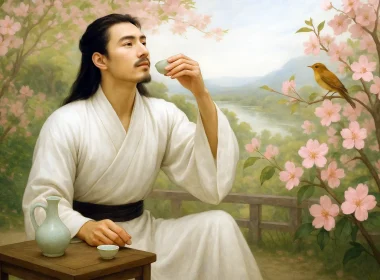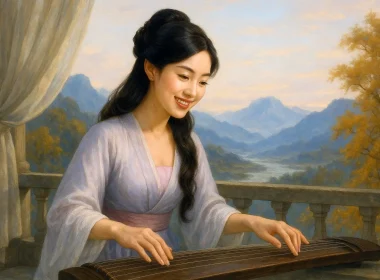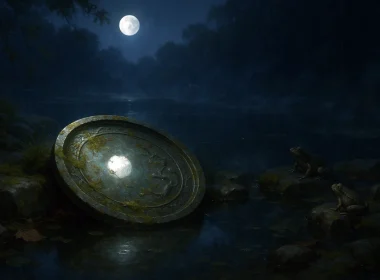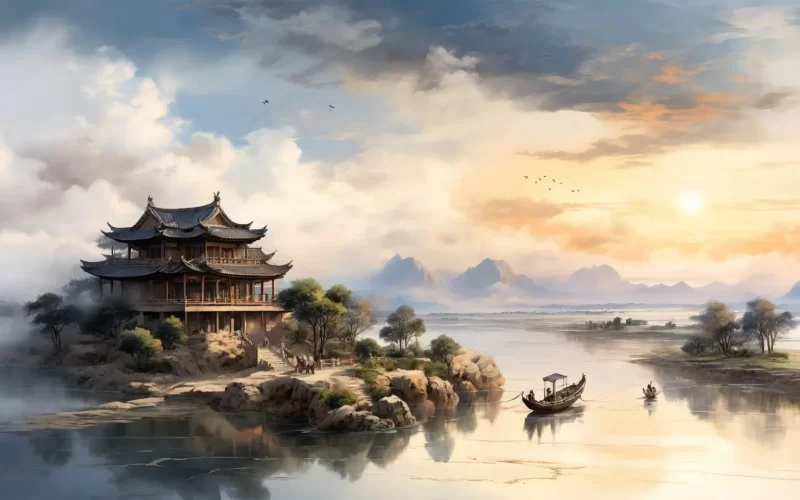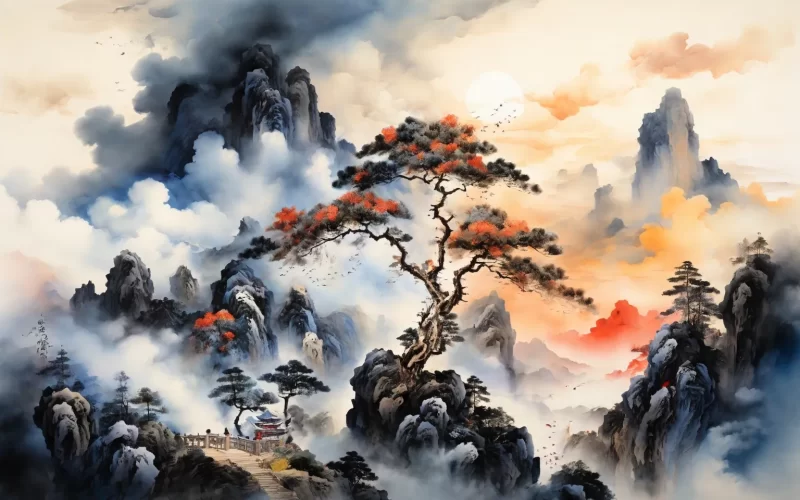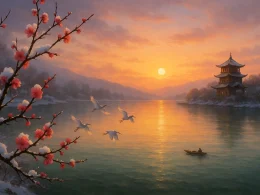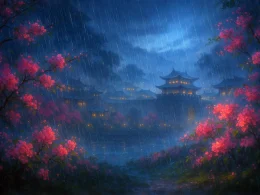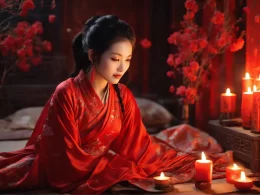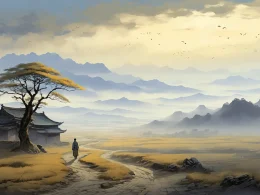Where long ago a yellow crane bore a sage to heaven,
Nothing is left now but the Yellow Crane Terrace.
The yellow crane never revisited earth,
And white clouds are flying without him for ever.
...Every tree in Hanyang becomes clear in the water,
And Parrot Island is a nest of sweet grasses;
But I look toward home, and twilight grows dark
With a mist of grief on the river waves.
Original Poem:
「黄鹤楼」
崔颢
昔人已乘黄鹤去, 此地空余黄鹤楼。
黄鹤一去不复返, 白云千载空悠悠。
晴川历历汉阳树, 芳草萋萋鹦鹉洲。
日暮乡关何处是? 烟波江上使人愁。
Interpretation:
The Tellow Crane Terrace is one of the representative works of the Tang Dynasty poet Cui Hao. It was written when he ascended Yellow Crane Tower. Located in present-day Wuhan, Hubei Province, the tower was originally built during the Three Kingdoms period and has long been a favored destination for scholars and poets to visit and compose poetry. Numerous legends surround the tower, with the most famous being that the immortal Zi'an once rode a yellow crane and flew away from the tower, making it a place associated with immortals and divine presence. Standing atop the tower, Cui Hao gazed into the distance, stirred by the scene before him, evoking memories of ancient figures and lamenting the passage of time, while also expressing a deep yearning for his distant homeland. Through a seamless blend of scenery and emotion, this poem became a renowned masterpiece among Tang Dynasty poems that express nostalgia and longing for home.
First Couplet:“昔人已乘黄鹤去,此地空余黄鹤楼。”
xī rén yǐ chéng huáng hè qù, cǐ dì kōng yú huáng hè lóu.
The immortals of the past have long ridden the yellow crane and departed, leaving behind only the empty Yellow Crane Tower.
The opening couplet immediately intertwines mythology with reality. The ethereal atmosphere of the Yellow Crane Tower is combined with the emptiness left behind after the immortals’ departure. The story of the immortals riding the crane away gives the tower its name, but also imbues it with an untouchable sense of otherworldliness and melancholy. Through this ancient tale, the poet sets the tone for the subsequent reflections on history and personal emotions triggered by his ascent.
Second Couplet:“黄鹤一去不复返,白云千载空悠悠。”
huáng hè yī qù bù fù fǎn, bái yún qiān zǎi kōng yōu yōu.
Once the yellow crane flew away, it never returned; for thousands of years, only the drifting white clouds remain.
This couplet further emphasizes the passage of time and the sense of impermanence. The yellow crane has long vanished, leaving only the vast expanse of empty sky filled with drifting clouds. This contrast between the fleeting presence of the crane and the enduring presence of the clouds not only expresses the poet’s awe at the tower’s history but also serves as a reflection on the brevity of life and the ever-changing nature of the world.
Third Couplet:“晴川历历汉阳树,芳草萋萋鹦鹉洲。”
qíng chuān lì lì hàn yáng shù, fāng cǎo qī qī yīng wǔ zhōu.
Under the clear sky, the trees of Hanyang stand vividly before my eyes; on Parrot Island, lush grass grows thick and green.
This couplet paints an expansive and vivid scene. Under the bright sky, both the distant city of Hanyang across the river and the nearby Parrot Island are clearly visible. The verdant trees and flourishing grass create a lively, picturesque setting, serving as a visual counterpoint to the poem’s growing emotional depth, while subtly foreshadowing the homesickness to come.
Fourth Couplet:“日暮乡关何处是?烟波江上使人愁。”
rì mù xiāng guān hé chù shì? yān bō jiāng shàng shǐ rén chóu.
As the sun sets, I wonder — where is my homeland? The misty waves of the river only deepen my sorrow.
In the final couplet, the poet’s gaze shifts from the distant scenery back to himself, as dusk falls and his yearning for home surfaces uncontrollably. The vast river, shrouded in mist, becomes both a natural landscape and a metaphor for the poet’s wandering heart. The interplay between sunset and the longing for home, along with the mist and the rising sorrow, brings the poem’s emotions to a poignant climax.
Overall Appreciation
Cui Hao’s Yellow Crane Tower is a poem built around the theme of ascending a tower and reflecting on the past. From his vantage point on the tower, the poet’s view encompasses both historic landmarks and the vast expanse of the Yangtze River. The mythical tale of the immortal riding away on a yellow crane adds a layer of mystery to the scene. The opening couplet contrasts the myth with the reality of the empty tower, evoking a sense of ethereal desolation. The second couplet contrasts the fleeting presence of the yellow crane with the timeless drift of white clouds, symbolizing the passage of time and historical vicissitudes. The third couplet broadens the scene, depicting the vibrant landscape of Hanyang and Parrot Island, creating a vivid and accessible picture. The final couplet then shifts inward, capturing the poet’s wistful longing for home at dusk, with the boundless river mist heightening his sense of displacement and sorrow.
The poem is marked by clear, natural language and a profound, expansive atmosphere. It blends the ethereal beauty of legend with the tangible beauty of the landscape, weaving together emotion and scenery, reality and imagination. As the poet gazes into the distance, his thoughts span across centuries, contemplating the past and present, personal longing and broader historical reflections. This seamless flow of emotions and imagery makes the poem a timeless masterpiece.
Writing Features
- Blending Imagination and Reality, Merging Emotion and Scenery
The poem skillfully integrates the legendary tale of the Yellow Crane Tower with the poet’s real experience of the present moment. The departure of the immortal, the drifting clouds, the flourishing grass, and the misty river all echo one another, creating a seamless fusion of fantasy and reality. - Layered Progression, Rich Emotional Depth
The emotional trajectory progresses naturally — from the melancholy of the immortal’s departure, to the vast emptiness left behind, to the serene beauty of the present landscape, culminating in the poet’s personal homesickness at sunset. This step-by-step emotional buildup gives the poem remarkable depth and resonance. - Simple Language, Profound Meaning
The poem’s language is plain and straightforward, with no overt embellishment, yet it conveys a sense of historical weight, personal reflection, and longing for home, all blended harmoniously. Its understated beauty is precisely what gives the poem its enduring power. - Flexible Structure, Natural Flow
Though written as a regulated seven-character quatrain, the poem does not rigidly adhere to formal constraints. Instead, it unfolds with natural ease, allowing the poet’s emotions and thoughts to flow freely, demonstrating Cui Hao’s distinctive poetic style.
Insights
Cui Hao’s Yellow Crane Tower reminds us that the most moving works of literature often come not from elaborate ornamentation, but from the sincere outpouring of genuine emotions. By anchoring himself on the iconic Yellow Crane Tower, Cui Hao draws on the ancient legend to evoke the mystery of the past, channels the beauty of the present landscape, and ultimately expresses his own longing for home as dusk falls. The seamless blending of personal feelings, historical awareness, and natural scenery exemplifies the artistic magic of combining imagination with reality and fusing emotion with scenery. This poem also reminds us that, no matter where we wander, the longing for home and the reflection on history remain enduring themes in Chinese culture.
Poem translator:
Kiang Kanghu
About the poet:
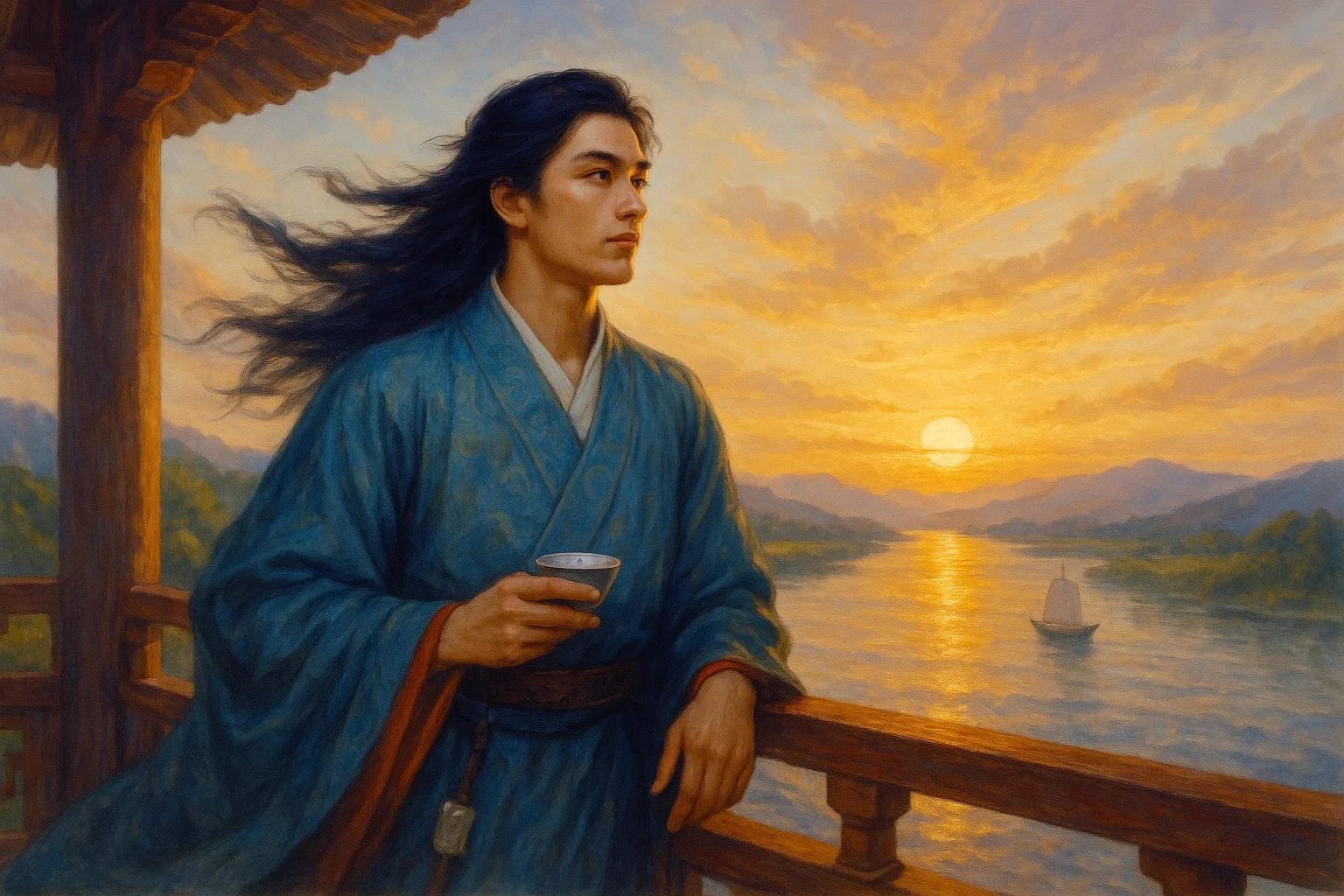
Cui Hao (崔颢), A.D. ? – 754, a native of Kaifeng, Henan Province. He was admitted as a scholar in 723 AD. At that time, Cui Hao was well known, along with Wang Changling, Gao Shi, Meng Haoran, and Wang Wei.


